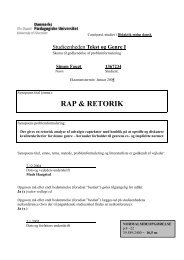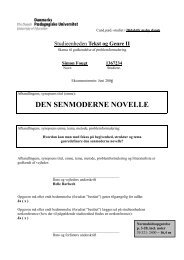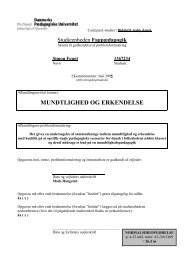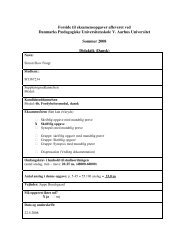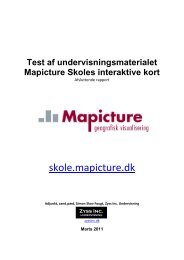Situation - Simon Skov Fougt
Situation - Simon Skov Fougt
Situation - Simon Skov Fougt
You also want an ePaper? Increase the reach of your titles
YUMPU automatically turns print PDFs into web optimized ePapers that Google loves.
SITUATION BASED TEACHING AND<br />
LITERACY EVENTS<br />
SIMON SKOV FOUGT<br />
PHD FELLOW, UNIVERSITY OF AARHUS, DENMARK<br />
Contact: sifo@dpu.dk<br />
Slides:i simon-skov-fougt.dk/main/foredrag<br />
A CASE STUDY WITH AN INTERVENTION<br />
SITUATION BASED TEACHING – PARIS IAMTE 2013<br />
SIMON SKOV FOUGT<br />
PARIS IAMTE 2013<br />
JUNE 13TH 2013
RESEARCH QUESTION AND OUTLINE<br />
› What happens to the ways in which teachers think<br />
and act when introduced to <strong>Situation</strong> Based<br />
Teaching and the principles of situated learning<br />
practices<br />
› Definitions: <strong>Situation</strong> Based Teaching, Literacy events<br />
› Method<br />
› Challenges<br />
› Means and ressources<br />
› Two cases<br />
› Findings<br />
SITUATION BASED TEACHING – IAMTE PARIS 2013<br />
SIMON SKOV FOUGT<br />
JUNE 13TH 2013<br />
2
SITUATION BASED TEACHING<br />
› Commonly accepted learning theory:<br />
› The best way to learn is by dealing with a meaningful<br />
problem in a meaningful and social so-called<br />
‘authentic’ situation (Bundsgaard, Misfeldt & Hetmar 2011)<br />
› <strong>Situation</strong> Based Teaching (SBT): Planning, completion<br />
and evaluation of courses, where subject matters are<br />
contextualized in social, meaningful situations<br />
(<strong>Fougt</strong> in press)<br />
› Contextualised and applied subject matters<br />
› Situated learning<br />
(Lave & Wenger 1991)<br />
SITUATION BASED TEACHING – IAMTE PARIS 2013<br />
SIMON SKOV FOUGT<br />
JUNE 13TH 2013<br />
3
LITERACY EVENTS<br />
› Literacy events are activities where literacy has a role<br />
› (Barton & Hamilton 2000)<br />
› SBT is one way to recontextualize (Bernstein 1996) literacy<br />
events<br />
› SBT is one way to deal with literacy events in a social,<br />
meaningful situation<br />
SITUATION BASED TEACHING – IAMTE PARIS 2013<br />
SIMON SKOV FOUGT<br />
JUNE 13TH 2013<br />
4
METHOD<br />
› 20 7th – 9th grade teachers at 4 different schools<br />
› Observed while teaching Danish (mother tongue)<br />
› Interviewed on their view of teaching<br />
› Intervention (SBT introduced at a workshop)<br />
› Joint planning individually with each teacher<br />
(discussions, meetings, mails, observations)<br />
› 20 projects of action research (Tiller 2004) – continious<br />
adjustments of the course<br />
SITUATION BASED TEACHING – IAMTE PARIS 2013<br />
SIMON SKOV FOUGT<br />
JUNE 13TH 2013<br />
5
CHALLENGES<br />
› The main challenge is tradition<br />
› School-only (Purcell-Gates et al 2007)<br />
› IRF / Two-thirds-rule (Sinclair & Coulthardt<br />
1975)/(Barton 2007)<br />
› Focus on isolated parts of the subject - e.g. spelling<br />
› (Bundsgaard & Kuhn 2007)<br />
› Focus on activities - They plan with a focus on doing<br />
instead of learning (Eva 2012)<br />
› To cope with the situation to recognize the subject<br />
matters = Scenario competence (Bundsgaard 2011)<br />
SITUATION BASED TEACHING – IAMTE PARIS 2013<br />
SIMON SKOV FOUGT<br />
JUNE 13TH 2013<br />
6
MEANS AND RESOURCES<br />
› SBT(<strong>Fougt</strong> in press, Bundsgaard, Misfeldt & Hetmar 2011)<br />
› Directed authonomy: The pupils’ attention is<br />
‘directed’ to selected parts of the subject matters<br />
› (Jensen 2007)<br />
› Primary traits – selected parts of the subject matters<br />
are evaluated (Berge 2005)<br />
› Intervention/Action research with a continious<br />
adjustment of the course<br />
SITUATION BASED TEACHING – IAMTE PARIS 2013<br />
SIMON SKOV FOUGT<br />
JUNE 13TH 2013<br />
7
SITUATION BASED TEACHING AND<br />
LITERACY EVENTS<br />
SIMON SKOV FOUGT<br />
PHD FELLOW, UNIVERSITY OF AARHUS, DENMARK<br />
CASES<br />
SITUATION BASED TEACHING – PARIS IAMTE 2013<br />
SIMON SKOV FOUGT<br />
PARIS IAMTE 2013<br />
JUNE 13TH 2013
CASES<br />
› Case 1: Writings of Martin Andersen Nexø and social<br />
injustice<br />
› - Danish curriculum canon – mandatory writers<br />
› Case 2: Culture canon<br />
› Reading, discussing and writing (literacy events) with<br />
and for a purpose<br />
SITUATION BASED TEACHING – IAMTE PARIS 2013<br />
SIMON SKOV FOUGT<br />
JUNE 13TH 2013<br />
9
CASE 1 - STARTING POINT<br />
› Writings of Martin Andersen Nexø and social injustice<br />
(canonized, mandatory writer) (8th grade)<br />
SITUATION BASED TEACHING – IAMTE PARIS 2013<br />
SIMON SKOV FOUGT<br />
JUNE 13TH 2013<br />
10
CASE 1 - THE SITUATION<br />
› Writings of Martin Andersen Nexø and social injustice<br />
(canonized, mandatory writer) (8th grade)<br />
› Challenge: Language<br />
› <strong>Situation</strong>?<br />
› Present the social injustice in a multimodal photo<br />
story - comparing with their own narrative on social<br />
injustice today in another photo story<br />
› Contextualize the literacy events<br />
SITUATION BASED TEACHING – IAMTE PARIS 2013<br />
SIMON SKOV FOUGT<br />
JUNE 13TH 2013<br />
11
PAINTINGS<br />
› Christian Krogh: Albertine in the Police<br />
Doctor's Waiting Room, 1887<br />
› Hans Andersen Brendekilde: Worn Out,<br />
1889<br />
› Erik Henningsen: Evicted, 1892<br />
SITUATION BASED TEACHING – IAMTE PARIS 2013<br />
SIMON SKOV FOUGT<br />
JUNE 13TH 2013<br />
12
CASE 1 - LITERACY EVENTS<br />
› Focus on social injustice - reading and listening to<br />
short stories/ Pelle the Conqueror<br />
› Reading with and for a purpose<br />
› Writing a draft letter from one of the characters<br />
› Visualizing/telling about his/her social injustice in a<br />
photo story<br />
› Discussing the photo stories<br />
› DA/PT: Point of view, social injustice, narration,<br />
wordings<br />
› Comparing with their own narrative on social<br />
injustice today in another photo story<br />
SITUATION BASED TEACHING – IAMTE PARIS 2013<br />
SIMON SKOV FOUGT<br />
JUNE 13TH 2013<br />
13
CASE 1 – LET’S GO HOME<br />
› Wealthy part of Denmark, north of Copenhagen<br />
› BMW, Audi, Mercedes<br />
SITUATION BASED TEACHING – IAMTE PARIS 2013<br />
SIMON SKOV FOUGT<br />
JUNE 13TH 2013<br />
14
CASE 2 – STARTING POINT<br />
› The Danish Culture Canon<br />
› http://kum.dk/Documents/Temaer/Kulturkanon/KUM_kulturkanonen_OK2.pdf<br />
› Architecture, art, design, movies,<br />
music, theater<br />
SITUATION BASED TEACHING – IAMTE PARIS 2013<br />
SIMON SKOV FOUGT<br />
JUNE 13TH 2013<br />
15
CASE 2 - THE SITUATION<br />
› The Danish Culture Canon<br />
› <strong>Situation</strong>: ‘The Ministry of Culture has decided to<br />
introduce a youth culture canon. A committee has asked<br />
pupils to present their proposals<br />
› Pupils in groups each present their proposal to the<br />
committee – a winner is elected<br />
› Two parallel «courses» - the school-only and the fictious<br />
- workning with the «authentic» canon Working<br />
with the Youth Culture Canon<br />
SITUATION BASED TEACHING – IAMTE PARIS 2013<br />
SIMON SKOV FOUGT<br />
JUNE 13TH 2013<br />
16
LITERACY EVENTS – CASE 2<br />
› Researching<br />
› What is youth culture?<br />
› Which 6 items should be canonized?<br />
› Reading and comparing quality<br />
› Arguing<br />
› Presenting<br />
› DA/PT: The argumentation<br />
› The visuals in the presentations<br />
› Reading and discussing the «authentic» culture<br />
canon – also as an argumentative text<br />
SITUATION BASED TEACHING – IAMTE PARIS 2013<br />
SIMON SKOV FOUGT<br />
JUNE 13TH 2013<br />
17
SITUATION BASED TEACHING<br />
SIMON SKOV FOUGT<br />
PHD FELLOW, UNIVERSITY OF AARHUS, DENMARK<br />
AND LITERACY EVENTS<br />
FINDINGS<br />
SITUATION BASED TEACHING – PARIS IAMTE 2013<br />
SIMON SKOV FOUGT<br />
PARIS IAMTE 2013<br />
JUNE 13TH 2013
SBT AND LITERACY EVENTS<br />
› What happens to the ways in which teachers think and<br />
act when introduced to SBT and the principles of situated<br />
learning practices?<br />
› Scenario based teaching - vs. <strong>Situation</strong> based teaching<br />
› It makes sense – a good buzz word<br />
› Literacy events with and for a purpose<br />
SITUATION BASED TEACHING – IAMTE PARIS 2013<br />
SIMON SKOV FOUGT<br />
JUNE 13TH 2013<br />
19
SBT AND LITERACY EVENTS<br />
› To cope with the situation to recognize the subject<br />
matters = Scenario competence (Bundsgaard 2011)<br />
is still difficult - uncertainty on the subject matters<br />
› <strong>Situation</strong> - organization and structure<br />
› Directed authonomy (Jensen 2007)<br />
› Primary traits (Berge 2005)<br />
SITUATION BASED TEACHING – IAMTE PARIS 2013<br />
SIMON SKOV FOUGT<br />
JUNE 13TH 2013<br />
20
AND THEN WHAT?<br />
› SBT contextualized subject matters – they are used<br />
› Some parts of the subject matters are neglected<br />
(DA/PT)<br />
› Holistic evaluations are needed from time to time<br />
› YES! But ... The understanding of subject matters is<br />
still a challenge (What shall they do vs. What shall<br />
they learn) (Eva 2012)<br />
› Slides: <strong>Simon</strong>-skov-fougt.dk/main/foredrag<br />
› Contact: sifo@dpu.dk<br />
SITUATION BASED TEACHING – IAMTE PARIS 2013<br />
SIMON SKOV FOUGT<br />
JUNE 13TH 2013<br />
21
REFERENCES<br />
› Barron, B (et al.) (1998). “Doing with Understanding: Lessons from Research on Problem- and Project-Based Learning”. I: The Journal of the Learning Sciences, 7(3/4),<br />
271-311<br />
› Barton, D. (20007): Literacy. An Introduction to the Ecology of Written language. Oxford: Blackwell Publishing<br />
› Barton, D., & Hamilton, M. (2000). “Literacy practices”. In D. Barton, M. Hamilton, & R. Ivanic (Eds.), Situated literacies: Reading and writing in context (pp. 7-15). New York:<br />
Routledge.<br />
› Berge, K.L. (2005). ”Skrivning som grundleggende ferdighet og som nasjonal prøve – ideologi og strategier”. I Aasen, A.J. & Nome, S. (red.): Det nye norskfaget. Oslo:<br />
Fagbokforlaget/Landslaget for Norskundervisning<br />
› Berstein, B. (1996): Pedagogy, Symbolic Control and Identity. Theory, Research, Critique. New York & Oxford: Roman & Littlefield Publishers<br />
› Bundsgaard, J. (2005). Bidrag til danskfagets it-didaktik – Med særligt henblik på kommunikative kompetencer og på metodiske forandringer af undervisningen. Ph.d.afhandling.<br />
Odense: Forlaget Ark<br />
› Bundsgaard. J. (2011). ”The missing link - prototypiske situationer som didaktisk kategori : en homage til Svein Østerud”. I: Nordic Journal of Digital Literacy, Vol. 6, Nr.<br />
Special_issue, 12.2011, s. 295-308<br />
› Bundsgaard, J. og Kühn, L. (2007): Danskfagets it-didaktik. København: Gyldendal<br />
› Bundsgaard, J., Misfeldt, M. og Hetmar, V. (2011): ”Hvad skal der ske i skolen? Et bud på en prototypisk situationsorienteret curriculumlogik”. I: It-didaktisk design. Cursiv<br />
nr. 8, 2011: København: Institut for Uddannelse og Pædagogik, Aarhus Universitet<br />
› EVA (2012). Fælles Mål i folkeskolen. En undersøgelse af lærernes brug af Fælles Mål. DANMARKS EVALUERINGSINSTITUT<br />
› <strong>Fougt</strong>, S.S: (in press): “Skrivning, situationsdidaktik og storyline”. In Friss, K. & Madsbjerg S (red.) Skrivelyst i fagene. Købehavn: Dansk Psykologisk Forlag<br />
› Gee, J.P. (2000). The new literacy Studies: From ‘socially situated’ to the work of the social. In D. Barton, M. Hamilton, & R. Ivanic (Eds.), Situated literacies: Reading and<br />
writing in context (pp. 180-196). New York: Routledge.<br />
› Hiebert, J., Gallimore, R., Garnier, H., Bogard Givvin, K., Hollingsworth, H., Jacobs, J., Chui, A.M.Y., Wearne, D., Smith, M., Kersting, N., Manaster, A., Tseng, E., Etterbeek, W.,<br />
Manaster, C., Gonzales, P. & Stigler, J. (2003). ”Highlights from the TIMSS 1999 Video Study of Eighth-Grade Mathematics Teaching”. National Center for Educational<br />
Statistics. US Department of Education.<br />
› Jensen, T.H. (2007). Udvikling af matematisk modelleringskompetence som matematikundervisningens omdrejningspunkt – hvorfor ikke? IMFUFA-tekst, nr. 458. Ph.D.afhandling.<br />
Roskilde: Roskilde Universitetscenter.<br />
› Lave, J. & Wenger, E. (1991): Situated Learning. Legitimate Peripheral Participation. Cambridge: Cambridge University Press<br />
› Mercer, N. (1995). The Guided Construction of Knowledge: Talk amongst Teachers and Learners. Clevedon: Multilingual Matters LTD.<br />
› Purcell-Gates, V., Duke , N. & Martineau, J.A. (2007). “Learning to Read and Write Genre-Specific Text: Roles of Authentic Experience and Explicit Teaching”. Reading<br />
Research Quarterly, v42 n1 p8?45 Jan-Mar 2007<br />
› Sinclair, J. & Coulthard, M. (1975): Towards an analysis of discourse: The English used by teachers<br />
and pupils. London: Oxford University Press.<br />
› Tiller, T. (red.) (2004). Aksjonsforskning. I skole og utdanning. Kristiansand: Høyskoleforlaget<br />
› Wegerif, R. (2004). “The role of educational software as a support for teaching and learning Conversations”. I: Computers and Education, vol 43, p. 179-191.<br />
SITUATION BASED TEACHING – IAMTE PARIS 2013<br />
SIMON SKOV FOUGT<br />
JUNE 13TH 2013<br />
22



